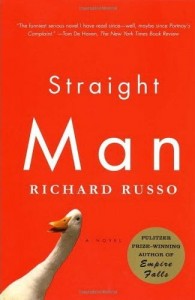 Title: A Death in the Family (Goodreads)
Title: A Death in the Family (Goodreads)
Author: Karl Ove Knausgård
Translator: Don Bartlett
Series: Min Kamp #1
Published: Harvill Secker, 2009
Pages: 400
Genres: Contemporary
My Copy: Library Book
Buy: Amazon, Book Depository, Kindle (or visit your local Indie bookstore)
A Death in the Family is the first book in the controversial six volume series by Norwegian author Karl Ove Knausgård. The controversy started with the title of the book Min Kamp, which is the same title as Hitler’s Mein Kampf as both translate to My Struggle. Secondly, while these are marketed as autobiographical novels, Knausgård has come under fire from friends and families for exposing their private lives. Karl Ove Knausgård has been often been called a Proustian and Min Kamp often compared to In Search of Lost Time. That is just enough pretention to make me want to pick up these novels and read them.
A Death in the Family (or My Struggle Book 1 in America) tells the story of Karl Ove Knausgård, a family man living in Sweden, trying to find the balance between his writing and his family. He reflects on his childhood and teenage years, as well as the loss of his father in what feels like a brutally honest portrayal of his life. What is interesting is the idea of this being an autobiographical novel rather than a memoir; as a reader I had to continuously remind myself of this fact. I had to question what is real and were liberties were taken. Honestly, I don’t think I could write about my childhood with such clarity and I suspect that the fiction was used to fill in the gaps and tell a better story.
Karl Ove Knausgård is approaching middle age, and with a young family I suspect that this six volume series is just a way for him to make sense of his life. Allowing him to work through issues and mistakes and explore different ideas he might have towards life. This is both an effective and fascinating insight of the life of a writer and I suspect it would have been very therapeutic for Knausgård, even if it caused friends or family members to hate him. As a novel, it is a roller coaster of emotions; sometimes it might come across as slow or even dull but that is life.
This first volume is even divided into two parts, one exploring the childhood/teenage years of Karl Ove and the other the death of his father. To understand the death of his father, obviously his childhood played a big part; his mother was almost invisible, always at work or somewhere and his father was distant and unpredictable. We often have a rose-coloured memory of our childhood but as Knausgård reflects on his past, you can recognise a similar distorted view in your own life. Karl Ove has a dark view on the world and death; it is interesting read this book in the context as he tries to understand his father and his death at such a young age.
While I can’t compare Karl Ove Knausgård to Marcel Proust (I really need to read him) or Min Kamp with In Search of Lost Time, I’m glad to have read this novel. I have reserved A Man in Love (Book 2) and I plan to read all six books. I like Knausgård’s view on the world and find it fascinating to read his books as he works through his own issues. His writing style obviously helps, I found great beauty in the dark and macabre views and credit has to go to Don Bartlett for the translation.
My only problem is going to be the fact that only the first three books of My Struggle have been translated and published. I suspect I will be caught up on this series very soon and I will have begin the year long waits between volumes. Book Four is expected in April 2015 and I am never going to learn Norwegian to avoid the wait. I have always shyed away from a series that is incomplete because of the wait but this sounded right up my alley and thought I had to try at least the first book; that was a mistake.
This was a pleasant balance between literary fiction and self-reflection. Karl Ove Knausgård even threw in some of his philosophical views; I remember some references to Danish philosopher Søren Kierkegaard in the text. This was so much more than an autobiographical novel of bewilderment, grief, relationship, love, loss and rock music; hard to explain but I recommend you experience it. Even if you just wish to increase your book snobbery levels, Karl Ove Knausgård’s My Struggle series is going to be something to watch. I suspect this will become a literary sensation, if it has not become one yet.

 Title: Dept. of Speculation (
Title: Dept. of Speculation ( Title: Straight Man (
Title: Straight Man ( Having recently read
Having recently read  Title: The Ways of the World (
Title: The Ways of the World ( Title: Levels of Life (
Title: Levels of Life ( Title: In Cold Blood (
Title: In Cold Blood ( Title: Skinjob (
Title: Skinjob ( Title: Provenance (
Title: Provenance ( Title: Cop Town (
Title: Cop Town (